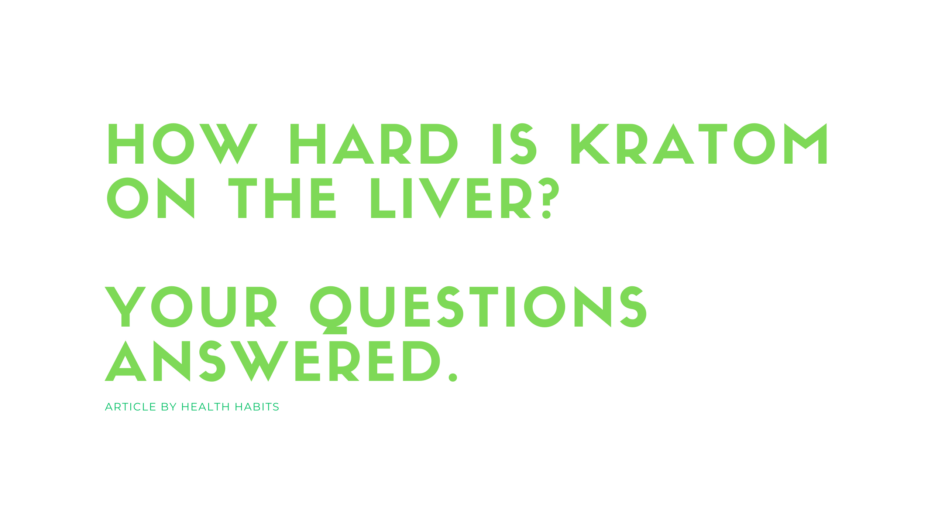Not many herbal supplements have gained attention and controversy as quickly as kratom has gained during its rise over the last few years.
Originating from the tropical forests of Southeast Asia, this botanical marvel has garnered a dedicated following seeking its potential benefits.
However, as with any substance, many interested individuals wonder about its safety and potential risks.
One pressing concern often voiced is, “How hard is kratom on the liver?”
In this article, we’re going to discuss kratom and the liver. We’ll explore the science, research, and expert opinions on this topic to shed light on the potential effects this herb may have on this vital organ.
What is Kratom and How Does it Work?
Kratom is a botanical treasure originating from the rainforests of Southeast Asia. It’s a remarkable herb that is used as a natural alternative for pain management, mental wellness, and longer vitality.
The plant is derived from the leaves of the Mitragyna speciosa tree and has a rich history of traditional use.
When consumed, kratom interacts with several key systems within the body, including the gastrointestinal tract, the liver, and the central nervous system.
Upon ingestion, the leaves of kratom undergo a fascinating journey, starting in the gastrointestinal tract.
The active compounds present in kratom, such as mitragynine and 7-hydroxymitragynine, are broken down by enzymes in the liver, which metabolize the plant’s alkaloids into various metabolites. These metabolites then circulate throughout the body, reaching their intended targets.
Kratom’s alkaloids engage with opioid receptors within the central nervous system in a unique manner.
They bind to mu-opioid receptors and the kratom stimulates the release of endorphins and enkephalins, promoting a sense of euphoria, relaxation, and pain relief. Plus, the interaction with delta-opioid and kappa-opioid receptors further contributes to its potential analgesic properties and mood-enhancing effects.
Kratom also interacts with other neurotransmitter systems within your body, such as serotonin and adrenergic receptors, which can both influence mood and energy levels.
Due to this, many see kratom as a holistic healing experience, addressing both physical and emotional well-being.
As usual with supplement use, kratom’s effects can vary depending on the strain, dosage, and individual factors, making the experience unique to each user.
(If you’re looking for high-quality kratom, click here to shop Viable Kratom’s wide selection of top-tier supplements that are backed by testing.)
Answering How Hard Kratom Is On The Liver
Extensive research and scientific studies have been conducted to explore the safety profile of kratom usage, including its potential impact on liver health, and more research is being done for the long-term effects of this herb.
We have seen some concerns raised regarding hepatotoxicity, but it is important to highlight that the vast majority of kratom users do not experience any liver-related issues.
Existing studies indicate that adverse liver effects associated with kratom are rare and occur in isolated cases–typically in contrast to dosing, untested supplements, or pre-existing physical conditions.
In full transparency and albeit rare, a small number of cases have been reported where individuals have experienced liver injury possibly linked to kratom usage.
However, it is essential to note that these cases are exceptional and not representative of the overall kratom user population.
The majority of kratom enthusiasts consume this herb without experiencing any adverse liver effects.
When evaluating cases of liver injury, we have to consider other factors that may contribute to hepatotoxicity in these individuals that are unrelated to kratom usage.
Many instances involve co-administration of other substances, such as pharmaceutical medications or alcohol, which can independently affect liver health on their own.
Plus, pre-existing liver conditions or the consumption of untested kratom products could potentially contribute to liver-related issues.
This is why we recommend using a top-tier supplement company like Viable Kratom. Click here to get third-party lab-tested kratom supplements in a variety of products with specific dosing instructions.
As mentioned, there have been reported cases linking kratom usage to liver injury, but it is important to remember that these instances are extremely rare. These cases represent only a fraction of the overall kratom users and the majority of individuals who use kratom experience no adverse effects on their liver.
These isolated cases should not overshadow the positive experiences reported by countless kratom enthusiasts who have incorporated this herb into their wellness routines.
When consumed safely, kratom has a wide array of benefits and is safe to use. If you are still skeptical, we recommend talking with your doctor about this decision so they can best guide you.
As with all supplements, responsible use and moderation play a vital role in maximizing the potential benefits of kratom while minimizing any potential risks to the liver.
You should always adhere to recommended dosages as suggested by reputable sources like Viable Kratom.
Taking excessive doses or consuming kratom too frequently may increase the likelihood of undesired effects.
But by using kratom responsibly and in moderation, you can enjoy the potential benefits it offers while reducing the risk of any unwanted side effects.
How Hard Is Kratom On The Liver In Conclusion
Kratom is a botanical treasure with a rich history of traditional use, offering potential benefits for pain management, mental wellness, and overall vitality.
Even though concerns about kratom’s impact on the liver have been raised, adverse liver effects associated with kratom are rare and occur in isolated cases.
The majority of kratom users do not experience any liver-related issues.
Extensive research has been conducted to explore the safety profile of kratom, and it is important to consider various factors when evaluating cases of liver injury.
Co-administration of other substances, pre-existing liver conditions, and the consumption of untested kratom products may contribute to liver-related issues. However, these instances are exceptional and not representative of the overall kratom user population.
Viable Kratom, a top-tier supplement company, provides third-party lab-tested kratom products with specific dosing instructions and ensures the highest quality and safety standards.
If you are considering trying kratom, Viable Kratom offers a wide selection of supplements to choose from like flower, gummies, extracts, and more.
By using kratom responsibly, you can enjoy its potential benefits, such as pain relief, relaxation, and mood enhancement, while reducing the risk of any unwanted side effects.
If you have any concerns or questions left, we recommend consulting with your doctor to make an informed decision about incorporating kratom into your wellness routine.
And if you’re ready to try high-quality kratom, be sure to visit Viable Kratom today to make your selection and embark on a holistic healing journey.
FAQs:
How hard is kratom on the liver?
Kratom’s impact on the liver is generally minimal and adverse liver effects associated with kratom are rare and occur in isolated cases. The majority of kratom users do not experience any liver-related issues when using this herb responsibly and in moderation.
What are the signs of liver damage related to kratom use?
Signs of liver damage can vary and may include jaundice (yellowing of the skin and eyes), dark urine, pale stools, abdominal pain, fatigue, and loss of appetite. However, it’s important to note that instances of liver damage associated with kratom are rare and occur in isolated cases.
Can kratom be safely used by individuals with liver conditions?
If you have pre-existing liver conditions, you should consult with your healthcare provider before using kratom. While kratom is generally considered safe for most people, if you have pre-existing liver conditions, you may have a higher risk of experiencing adverse effects.





Leave a Reply